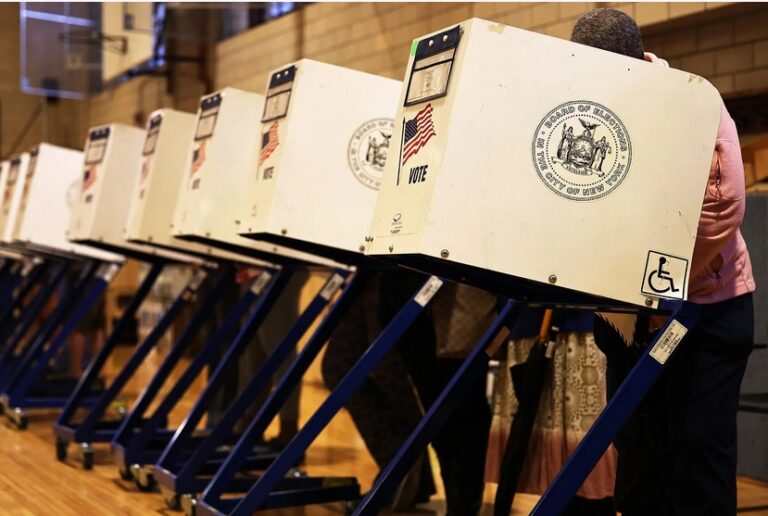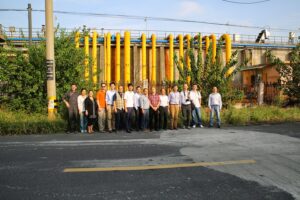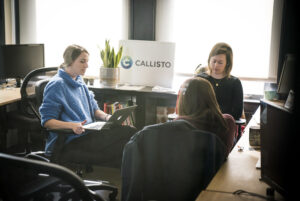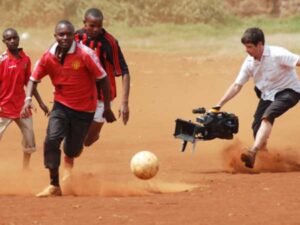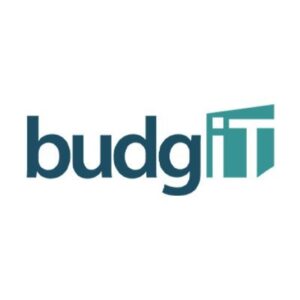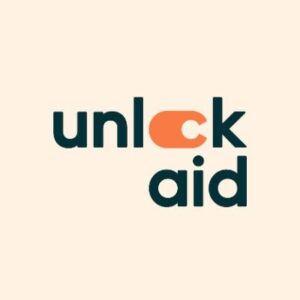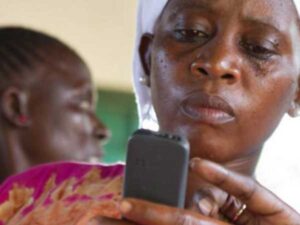The Task Force on American Electoral Reform was created by academics and scholars to study institutional solutions and reforms that can help ameliorate and combat extremism.
Edward Foley of the Task Force on American Electoral Reform spoke with Ambika Samarthya-Howard on December 4, 2023. Click here to read the full conversation with insights highlighted.
Ambika Samarthya-Howard: If you can please start by introducing yourself and telling me more about the organization and your approach.
Edward Foley: I’m Ned Foley or Edward Foley is my real name, nickname Ned Foley. My field is election law and I’ve been doing that for a while. In terms of the task force, what happened was shortly after January 6th, the insurrection, several of us who knew each other from our work in this space thought it’s a crisis moment and asked ourselves “what do we need to do to improve American democracy and specifically combat the problem of extremism?” We had been worried about extremism prior to January 6th, but the January 6th riot at the Capitol was the visual ugliness of how extremism can manifest itself. The basic thesis of first, there were three of us, Larry Diamond at Stanford and Rick Pildes at NYU. Larry Diamond’s a political scientist. Rick Pildes is a law professor like me.
The three of us thought that the institutions of our political system and specifically, our electoral institutions, magnified the problem of extremism making it worse. What happens is, unfortunately, there are extremist elements within the public, but through ways that I’m happy to explain, our task force is working on the institutions that magnify that and exacerbate the problem. That means that institutional solutions, institutional reform can help address and ameliorate and combat extremism. That’s the predicate. We created this group of about 35 scholars, many political scientists, some law professors, some who work in think tanks, all devoted to analyzing the pathology of extremism that’s within our body politic. Then thinking about the right prescription for this pathology, I like to use that medical analogy intentionally. I think our goal here is there to correctly diagnose the illness that is apparent, and then figure out the right medicine to prescribe to correct the illness that exists.
There’s a steering committee of about eight of us, and the 35 of us are broken out into different groups focusing on different aspects of the problem. There’s a group focusing on campaign finance laws [among others]. Some people in the past have thought, “Well, the way to make campaign finance more democratic is by elevating small dollar donations and using the internet as a technology that will allow small dollar donations to level the playing field.” You can understand the impetus behind that. But it turns out that small dollar donations tend to actually exacerbate extremism. The biggest internet fundraisers and small dollar fundraisers are some of the most extreme voices in Congress. For example, extremism gets attention and that amplifies their message through internet donations. So we’ve been rethinking what’s the right set of campaign finance laws to avoid amplifying extremism. That’s one facet of the work.
Ambika Samarthya-Howard: What is the method or how is it that you’re coming to these conclusions? And what do you do with the conclusions? Are you a policy advocate?
Edward Foley: All of us are academics professionally. There are organizations as you know that are policy advocacy specialists, and we interact with them and look at their work and hopefully our work will help them. We are prescriptive as well as analytic in the sense that we are doing independent and new research. We’re building on existing research on these topics in academia. Some of the members of our task force have done their own groundbreaking work on things like negative partisanship and effective polarization, for example, and various other topics that are relevant to the issue of extremism.
We’re not reinventing the research wheel, if you will, but we’re relying on what’s already been done and we’re trying to extend that into new avenues. The first phase of what we did and have been doing is identifying gaps in the research and holes in it. For example, one research project that’s underway through the grant that we’ve been fortunate to receive is with respect to an innovative electoral system, a different form of ranked choice voting. People may be familiar with the idea of ranked choice voting, but it turns out there are different forms of it.
What we want to do is there’s a reform, a particular version that is attractive from a theoretical perspective in combating extremism, but it is susceptible to strategic manipulation by voters trying to game the system. We’ve contracted with another political scientist who’s not a member of the task force, but was identified through the task force membership who’s an expert on the problem of strategic voting. Working with him, we’ve designed a research instrument that will test this innovative idea that comes from another task force member to see whether it’s susceptible to strategic voting. That’s an example of building off of existing work, but taking it to a new place that’s really important. We wouldn’t want to advocate adopting this innovative reform if it was going to fail upon arrival because of manipulation. So the ultimate goal, to answer your question directly, is to make recommendations, specific recommendations as to policy solutions that could solve the problem of extremism. The idea is a menu of options. There’s not going to be one single magic solution, unfortunately.
There’s going to be a menu of options, and the hope will be that states will implement from the menu and experimentation among all 50 states will help test what works and what doesn’t work – or what works better and what works less effectively. Some things may work for some states that don’t work for other states. This is a big problem that is confronting the country right now, and it’s confronting other countries around the world. We hope that through the efforts of the 35 scholars tackling the problem, that we can come up with a sound menu of policy reforms to deal with it.
Ambika Samarthya-Howard: It feels like it’s very theoretical, like you’re still putting forth recommendations. If it’s not yet determined, how do you know if you’re being successful? What is the evidence that any of this is working?
Edward Foley: If it’s adopted and we think that ballot initiatives in states that have the ability to go to the ballot with reform will be the place to implement at least some of what we propose. To give you an example, Alaska adopted a significant reform a couple of years ago that first got tested in last year’s midterms. It’s a version of ranked choice voting using nonpartisan primaries. We’ve been analyzing the results of that,and the reform looks to be quite successful in what it aims to do. The way I would analogize to medicine, it’s one antibiotic that is effective at treating the disease, but it might not be the most effective antibiotic. The amount of disease that Alaska specifically is suffering in this regard is less than some other states. For example, Nevada is thinking about doing a version of the Alaska reform. They’re in the middle of adopting a version of Alaska reform.
The question is whether Alaska’s medicine will be strong enough for Nevada. Nevada probably should try Alaska’s medicine because they’re in the process of doing it, and so let’s go forward with that. But take Arizona as a state similar to Nevada. Arizona hasn’t started the process of trying to adopt one of these reforms yet. Maybe Arizona should adopt the Alaskan system or maybe Arizona needs stronger medicine. So how do we know whether our work will be successful if states look at the menu and realize the drugstore has more than one ingredient on the shelf? The question is, what’s the right ingredient for the particular jurisdiction or the particular locality? Again, I wish it were simple [in a way where] everybody just takes two aspirin and feels better, but it’s, unfortunately, not like that for reasons I could get into. Some of this, again, is the idea of ranked choice voting has been around for a while, but the idea of these innovative forms of ranked choice voting are new. They’re like the newer medicine.
Ambika Samarthya-Howard: What are some things you’ve learned while you’ve been doing this work that you think are lessons that others could possibly be interested in as well? What do you think would be helpful for people trying to do similar work?
Edward Foley: That’s a great question. I guess two things come to mind immediately. One is, it is a challenge when you’ve got 35 people who are all incredibly knowledgeable and accomplished and are the right people to be involved in this project and want to be involved and are sincere, and yet, don’t all agree. How do you navigate that disagreement?
The world doesn’t stop spinning. In fact, I was talking recently to a doctor using this analogy and I said, “What if you had 35 medical experts when the pandemic first arrived and they all wanted to solve the COVID pandemic, and they were well-intentioned and they were the smartest doctors and they couldn’t all agree about what vaccine to design and so forth?” We’d be worried about the quality of the medical profession. This person said, “Well, no, maybe the members of the public don’t understand this, but that’s the way medicine works. There isn’t necessarily universal agreement about the best vaccine. Sometimes you have to try different ones. Sometimes those conversations are behind closed doors, and then you all agree, ‘All right, we’re going to do this.’ But the one thing that doctors can’t do is nothing. You can’t sit on your hands and say, ‘Well, we’re not going to worry about the pandemic.’ We’ve got to try to use our best judgment with imperfect knowledge.”
I think the political science space has to recognize that the problems of American democracy are severe and acute enough that doing nothing isn’t an answer, and we’ve just got to figure out as best we can with the knowledge that we currently have. But when 35 people are involved in a project collectively and have to figure out their degree of agreement or disagreement and what are they going to say, that is a challenge. So to the extent that other grantees from Skoll have gone through those experiences, I think that’s the kind of cross-pollination that could be really useful because again, in a more formal way than just this conversation I had with another doctor, if there’s lessons to be learned about managing that disagreement efficiently and effectively to speed up the work that needs to come out faster, I think that is something that communication across grantees would be really helpful.
The other thing is the United States is a big country and there’s lessons to be learned from comparing 50 states to each other. We’re not the only country in the world and the extent to which systematically more lessons can be learned from other countries’ experience with similar things, and where that’s valuable and where it doesn’t translate [is important to consider]. For example, one of the topics that has gotten a lot of our attention is the idea of proportional representation, which Europeans use and we’re spending a lot of time on because it could really help deal with the problems on which we’re focusing. On the other hand, most of the countries in Europe that use proportional representation are so-called parliamentary systems. They don’t have presidents, or if they do, the presidents are figureheads, but the prime minister really is the head of the government.
We have a different kind of system. Figuring out the degree to which that good idea can work in our context is a translation question, which doesn’t have an immediately obvious answer. It would be nice to know if, again, there’s more infrastructure that could be learned through others who have had similar translation questions arise. Maybe the healthcare industry. Britain has one kind of healthcare, Canada has another kind of healthcare, but just importing something that works somewhere else to the United States may or may not work given different cultures, different ways of our legal systems and so forth. So cross-pollination on that translation issue could also be useful.
Ambika Samarthya-Howard: Outside of funding, which is a challenge for everybody, are there any challenges in your work that you haven’t been able to dismount?
Edward Foley: The biggest challenge methodologically is that you can’t have data on something that hasn’t been tried before. We want to be data-driven because we don’t want to just do something because somebody has a hunch. Again, you want medicine to be data-driven too. On the other hand, and again, vaccine people, they conduct trials of vaccines before they release it to the public and get FDA approval. That doesn’t exist in the political space in the same way. You can’t try a new electoral system in some city as a Guinea pig. It just doesn’t work the same way. That has been the biggest methodological challenge that I can think of. The research project that I mentioned with the University of Chicago scholar is our best attempt to confront this problem through this kind of experimental survey. We’re trying to replicate a real world situation as much as possible. Maybe that’s analogous to a vaccine trial, but it’s not a direct analogy.
Somebody has to be the first state. Another obvious thing to think about is, “Oh, well before trying a new electoral system at a state level, try it at the city level. It’s less risky to have the city of Boston try it before the state of Massachusetts does”, for example. But politics at the city level is not the same as politics at the state level. Maybe Boston and Massachusetts aren’t the best examples. But say that you think there’s a problem of extremism in Texas, for example, trying something out in Houston isn’t going to tell you how effective your method is for Texas-wide extremism. It’s going to just tell you how it works within the political culture of Houston, which is important, but not the same thing as the political culture of Texas as a whole.
We think state-level reform is really important, so which state is going to be the first state to do a bold experiment to tackle this problem? Everybody wants somebody else to be the first, so that’s part of the challenge.
Ambika Samarthya-Howard: That makes a lot of sense. What do you need from the other actors and partners in your ecosystem to advance systems change?
Edward Foley: I think this question is an especially important one, and I want to be somewhat modest about our task force role. We think of ourselves as a component in an overall effort to help America, and other people are going to have to take our work and make some judgment. For example, I was talking to a reform organization in one of these states and said, “Look, again, I can be like a doctor and I can tell you what the diagnosis is and I can tell you what the risks of different prescriptions are because they come with side effects and risks, but you or somebody else is going to have to make the decision of which to adopt. I can make a recommendation, but you’ve got to make the decision.
Ambika Samarthya-Howard: When you say you, who is the “you”?
Edward Foley: I think there’s different “yous”, but [here’s an example]. I’ll pick my home state of Ohio. Let’s say somebody wants election reform in Ohio to deal with the problem of extremism, and we have the problem of extremism in Ohio. One question is time, “when do you go?” And Ohio is a state that has a ballot initiative system. So you can go to the ballot with a reform in the hope that the citizens will adopt it. That’ll cost a certain amount of money, and you have to think about the timing of that. In Ohio specifically, you have to wait a little bit because there’s going to be an effort in 2024 to fix the problem of gerrymandering in the state, which they tried to fix earlier, didn’t fix, and they’re going to try to fix it again.
If you want to do something beyond fixing gerrymandering, like say the Alaskan style, nonpartisan primary or ranked choice voting or something like that, do you want to compete against the anti-gerrymandering? There’s some coordination of different reform efforts in communities that has to go into thinking about that. Do you want to do it in 2024, 2025, 2026, midterm election, an off-year election, or a presidential election? What’s your environment? It’s going to cost a lot of money to do this whenever you do this, and what do you think the opposition’s going to look like? Then added to those strategic judgments, if you’re asking the public to adopt something it’s not just to have it be a good idea, it’s got to be sellable to the public and understandable by the public, and ultimately, embraced by the public. That’s where there’s a trade-off between novelty and familiarity. Now, most Ohioans aren’t familiar with the Alaskan system, so in some sense, you’re starting from scratch if you want to adopt a new reform along those lines. On the other hand, it is advantageous to be able to tell the folks in Ohio, “Look, you’re not the first. Alaska’s done it. It’s successful in Alaska. Do the same thing.” On the other hand, what if the political conditions in Ohio are such that the Alaskan system is not likely to be successful in Ohio and you’re spending this huge amount of money on a campaign? Do you still do the Alaskan system because you’re afraid that’s the only thing that could be adopted, and it’s weaker medicine, but it’s better than nothing, and it might have a chance of succeeding?
Or do you roll the dice and go for the newer, more experimental medicine worrying, “Well, the public’s going to be skittish about it.” So that judgment, the task force can contribute that based on the knowledge it has to get to that part of the conversation. But other players are going to have to weigh in on other essential elements of that conversation in terms of the risk/reward calculation on any particular reform method. That’s the distinction between our group, and as you said, the policy advocate community is going to have to take what we can tell them based on our insight and research. They’re going to have to say, “yeah, but it’s too risky,” or ask if it is worth the risk in Ohio, but not in Nevada,” kind of thing. So some additional conversations are going to have to happen in light of the work that we’re doing.
Ambika Samarthya-Howard: One of the questions I’m supposed to ask you is where you see this work going in five years, but I want to ask you, where do you see this work going by next year? I’m really curious how quickly you think some of this stuff could get into place before the next presidential election, and also if you don’t think it’s going to happen before the next presidential election, what the longer term play is with this work?
Edward Foley: I think realistically one subgroup of our efforts is looking at the presidential election process, but that’s underway with the presidential primaries. There’s a few relatively modest reform packages that could still help in this presidential cycle. But in all honesty, we have to survive 2024 in terms of having our democracy intact and then build on that going forward. I think it’s going to be important that the Nevada reform will be on the ballot in November of 2024. I think it’s important that that be adopted and successful, and if it’s not, we’ll have to regroup and rethink, “why not?” But I’m optimistic about that, and let’s assume that that’s successful.
Have you heard of the concept of the Final Five system that it’s a variation on? Final Five, it’s a nonpartisan primary, just like Alaska is, also just like California. What California has is a top two nonpartisan primary that just sends two candidates to the general election and uses a regular ballot, either A wins or B wins. It’s pretty straightforward.
The innovation that Alaska did was say, “We’re going to have a top four nonpartisan primary and use ranked choice voting to pick one winner out of four.” Nevada is extending that with, they call it “Final Five”. We’re going to have five candidates come out of the nonpartisan primary and use the same ranked choice voting method to pick one winner of the five. So as a practical matter, there’s not a lot of difference between the Nevadan system and the Alaskan system unless you think it helps voters to have five choices in November instead of four. There’s some people who will say, “Well, that just confuses voters a little bit more.” But anyway, we’ll see. The Nevada system is sound for the same reasons that the Alaska system is, and so let’s get that adopted in Nevada, which needs a new system.
Beyond Nevada, I think there’s states like Arizona, Ohio, Florida, Michigan, there’s a lot of states around the country that have the same kind of initiative system, but I would say if they’re going to go for reform in 2025 or 2026, let’s say, before jumping on the Alaska-Nevada bandwagon, there’s modest tweaks to that that would be powerful. Again, it is the difference between one vaccine and another vaccine that are quite similar, both pretty effective, but one might be even more effective. So what I’d like to see happen over the next couple of years is a conversation that’s already started with the great work of other people, but is more robust in light of what our task force is doing, and therefore, the judgment is a more sophisticated judgment made by the people who have to make these decisions about, “Okay, what are we going to try to accomplish in these various states?”
Ambika Samarthya-Howard: What insights do you think you have that you could share with others around your work?
Edward Foley: Going back to the point about data, data is crucial. I think it’s important for anybody trying to solve a problem to be precise analytically about the degree to which one’s thinking about the issue is the question, “are you worried about fact? Is this an issue of fact or is an issue of values or a combination?” Facts are objective things and matter and cannot be ignored. But some judgments are moral judgments, value judgments, normative judgments. While facts are relevant to making judgments, especially when it’s risk analysis, sometimes your judgment has to be, “Okay, what values do you prioritize?” That can be tricky because everybody says, “Everybody loves democracy,” but what exactly do you mean by loving democracy? And that’s not just a factual issue. There is obviously an election-specific dimension to that, but there may be other aspects of social policy that also require a combination of fact analysis, and also value prioritization and analysis.
Ambika Samarthya-Howard: That’s really well said. Is there anything else you want to add that we didn’t cover that you feel is important?
Edward Foley: Maybe two more points. One is I think the national conversation on topics is really important. For a long time, understandably all in good faith, the national conversation around elections has been dominated by a paradigm that the most important things are issues of access, the right to vote and avoiding disenfranchisement. I don’t mean to minimize that. Obviously, everybody deserves the right to vote, and we ought to make voting easy and accessible. I’m a fan of drop boxes, for example. But if we’re, again, analytical and systematic in our analysis about the real threats to translating the will of the people into governance, the biggest threats right now are these structural issues. There’s a denial of the will of the voters, not because they can’t cast a ballot, but because the ballot that they cast is getting translated into results that skew the outcomes. In the words of one important scholar in this space, it causes misalignment.
What you want in a well-functioning democracy is an alignment between inputs and outputs. You do not want governance based on only what part of the people want, because that’s skewing. You want an output that corresponds to the “we the people have the right to govern ourselves”, one person, one vote, equal participation. The result has to be fairly and equally reflective of all of our rights to participate. So yes, no disenfranchisement, absolutely. But again, if we’re accurately diagnosing what the most grave threat at the moment, it’s this misalignment. The national conversation of the media and some reform groups and stuff, it’s not allowing us to prioritize and have the impact that we need to have because our conversation doesn’t have the absolute best vocabulary for what we need. I don’t think one organization, these 35 people can solve that, but can we help make an adjustment to the national conversation to give more space for this alignment point?
There is a rollout of new knowledge on a topic that people think they know about. In American culture, for whatever historical reasons, we tend to revere the founders. If James Madison thought it then it must be right, and everything has to be reexplained as this is something that Thomas Jefferson would’ve wanted or George Washington would’ve wanted, and we can be happy that they set our great experiment into motion. But they were not perfect, and they realized it. More to the point, it surprised me in a good way, since there is new knowledge being developed on these topics on a month-by-month, almost week-by-week basis, that it’s really going to be beneficial to integrate that newness into a political culture that already exists that isn’t familiar with the new. They didn’t learn it in high school. They didn’t learn it in college, and so that’s a challenge.
Ambika Samarthya-Howard: Thank you for your thoughts and time.
Click here to read the full conversation with insights highlighted.
Ambika Samarthya-Howard (she/her) is the Solution Journalism Network’s Chief Innovation Officer: She leads on innovation and technology, leverages communication platforms for the network strategy and creates cool content. She has an MFA from Columbia’s Film School and has been creating, teaching and writing at the intersection of storytelling and social good for two decades. She has produced content for Current TV, UNICEF, Havas, Praekelt.org, UNICEF, UNFPA, Save the Children, FCDO, Global Integrity and Prism.
* This interview has been edited and condensed.
Find other organizations that are working to combat extremism.

